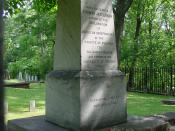This is a review of an essay by Arlette I. Willis 'LIBERTY AND LITERACY' I think Willis' main goal to the readers here was to show how education can open many doors, but at the same time close many minds. Beginning with Thomas Jefferson's belief that an educated literate populace would be able to safeguard their freedoms, she starts by discussing some history of literacy and education in early America. She explains early literacy as nothing more than being able to read and write ones name. (How effective this must have made the voters of our glorious county at its birth.) She then goes on to bring up many popular beliefs in more precise definitions of literacy, and the necessity for them. These types being conventional, functional, cultural, and critical or emancipatory literacy. This is followed up by, what may be thought of as something of a conspiracy theory, "hegemony theory."
Basically summed up, this is an idea that the general populace is controlled through a collection of mass media, education, government, and just about every other social interaction by an upper echelon of society holding key positions in corporate, government, and the community all holding similar beliefs. One well-described example is that of Jean Anyon in a description of schools and their structure. She describes three models in particular. First, the power structure that the students must follow the rules not only of the teacher, but those the teacher must follow of the institutionalized authority, the principle, and so on. Second, that concepts like cooperation and teamwork, though more accentuated today, are still largely emphasized only in "extra"caricular activities. Where any achievement is highly competitive and individualistic. Third, is a segregation of the students in a variety of groupings which is not only accepted by the student, because that's...


